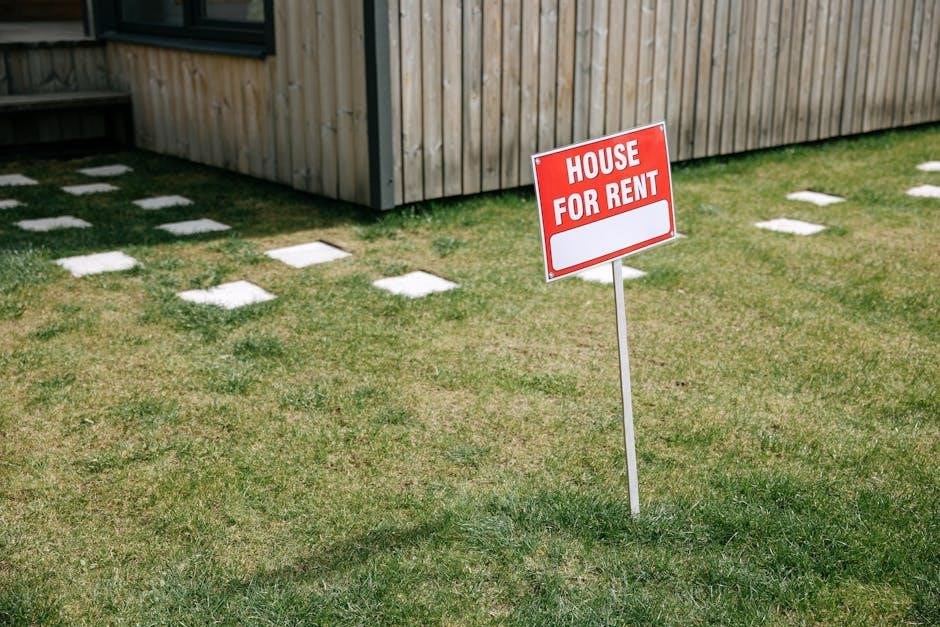rental agreement in spanish pdf
A rental agreement in Spanish outlines the terms for property use between a landlord and tenant, ensuring legal protection and clarity for both parties, while complying with local laws and regulations.
Definition and Purpose
A rental agreement in Spanish, known as contrato de alquiler, is a legal document outlining the terms and conditions for renting a property. It establishes the relationship between the landlord (arrendador) and tenant (arrendatario), ensuring clarity on property use, rent, duration, and responsibilities. The purpose is to provide legal protection for both parties, prevent disputes, and comply with local laws. It typically includes details like property description, payment terms, and tenant obligations. This contract is essential for formalizing the agreement, safeguarding rights, and ensuring transparency in the rental process, making it a cornerstone of property transactions in Spanish-speaking countries.
Benefits for Both Parties
A rental agreement in Spanish offers numerous benefits for both landlords and tenants. For landlords, it ensures timely rent payments, legal protection against property damage, and clarity on tenant responsibilities. Tenants benefit from a formal agreement that outlines their rights, rent stability, and usage terms, reducing the risk of unfair evictions or sudden rent increases. The contract also provides legal security, ensuring both parties understand their obligations and can resolve disputes amicably. This mutual understanding fosters a transparent and harmonious rental relationship, protecting the interests of all involved while complying with Spanish legal standards.

Importance of a Written Rental Agreement
A written rental agreement safeguards both parties’ rights, provides clarity on terms, and ensures legal compliance, minimizing disputes and protecting against potential conflicts in Spain.
Legal Protection
A written rental agreement in Spanish provides legal protection for both landlords and tenants by establishing a clear, legally binding document. It ensures compliance with Spain’s rental laws, such as the Ley de Arrendamientos Urbanos, safeguarding property rights and tenant protections. The agreement serves as evidence in court, resolving disputes over rent, duration, or property conditions. Witnesses or a notary public can authenticate the contract, adding another layer of legal security. This formalization prevents misunderstandings and ensures both parties are aware of their rights and obligations, making it a crucial tool for avoiding legal conflicts in Spain’s rental market.
Clarity in Terms
A Spanish rental agreement ensures clarity in terms by detailing property specifics, rent, payment methods, and tenancy duration. It outlines landlord and tenant responsibilities, preventing future disputes. Clearly defined terms help both parties understand their obligations, reducing misunderstandings. The agreement includes essential clauses like rent increases, maintenance duties, and termination conditions, providing transparency. Properly structured agreements ensure all aspects of the tenancy are addressed, fostering a harmonious relationship between landlord and tenant. This clarity is crucial for a smooth rental experience, as it establishes mutual expectations and responsibilities from the start.

Types of Rental Agreements
Rental agreements in Spanish include residential, commercial, and short-term contracts, each tailored to specific needs, ensuring legal compliance and clear terms for all parties involved.
Residential vs. Commercial
A residential rental agreement in Spanish is designed for housing, ensuring tenant comfort and safety, while a commercial agreement focuses on business use, with detailed terms for property utilization and maintenance responsibilities.
Short-Term vs. Long-Term
Spanish rental agreements differentiate between short-term and long-term contracts. Short-term agreements, often for tourism or temporary stays, last less than one year, while long-term agreements exceed one year, offering stability for tenants and landlords, with specific legal protections and renewal options tailored to each duration type.
Room Rental Agreements
A room rental agreement in Spanish is designed for tenants renting a single room within a shared property. These contracts outline the terms of occupancy, rent, and responsibilities, ensuring clarity for both parties. They often include specific clauses about shared spaces, utility payments, and tenant behavior. Unlike full property rentals, room agreements focus on individual spaces and may have shorter durations. Legal requirements ensure protections for tenants, such as minimum stay periods and eviction processes. Templates for room rental agreements are widely available in PDF and Word formats, allowing landlords to customize terms while adhering to Spanish housing laws and regulations.

Key Components of a Spanish Rental Agreement
A Spanish rental agreement must include duration, rent details, deposit terms, tenant and landlord responsibilities, and signature authentication, ensuring clarity and legal compliance for all parties involved.
Duration of Tenancy
The rental agreement in Spanish must specify the duration of the tenancy, including the start and end dates. Fixed-term contracts detail the exact period, while open-ended agreements lack a defined end date. Renewal options and conditions for extension should be clearly outlined. Spanish law typically requires a minimum rental period, often one year, before the tenant can terminate the contract. Both parties must agree to any extensions or renewals in writing; The contract should also state the notice period for termination, ensuring compliance with Spanish tenancy laws. Clearly defining the duration helps prevent disputes and ensures both parties understand their obligations from the outset.
Rent and Payment Terms
The rental agreement must detail the rent amount, payment methods, and due dates. It should specify whether rent is paid monthly, quarterly, or annually. Payment methods, such as bank transfers or in-person payments, must be clearly stated. The agreement should also outline any late payment fees and grace periods. Rent increases must be specified, including the percentage or formula used for calculation, and must comply with Spanish tenancy laws. Taxes and fees, such as IVA or property taxes, should be addressed, clarifying who is responsible for each. This section ensures both parties understand their financial obligations and avoids disputes over payments. Clarity is essential to maintain a smooth tenancy relationship.
Security Deposit
The security deposit, or “fianza,” is a common requirement in Spanish rental agreements, ensuring the landlord is protected against potential damages or unpaid rent. The deposit amount is typically one or two months’ rent and must be returned within 30 days after the tenancy ends if no damages or issues arise. The agreement should specify how the deposit will be managed and under what conditions it may be withheld. Both parties should retain a copy of the deposit receipt. Additionally, the deposit must comply with Spanish laws, such as registration requirements, to ensure legal validity and protect both tenant and landlord interests effectively.
Tenant and Landlord Responsibilities
In a Spanish rental agreement, both tenants and landlords have specific responsibilities; Tenants are obligated to pay rent on time, maintain the property, and use it as agreed. They must also comply with the terms of the contract and notify the landlord of any necessary repairs. Landlords, on the other hand, must ensure the property is in habitable condition, address maintenance issues promptly, and respect the tenant’s right to peaceful enjoyment of the property. Both parties must adhere to legal obligations, such as providing proper notice for contract termination and respecting the agreed-upon terms. Mutual respect and clear communication are essential to a harmonious tenancy;

Legal Requirements for Rental Agreements in Spain
Rental agreements in Spain must be in writing, comply with the Urban Leasing Law (LAU), and include essential clauses like duration, rent, and deposit. Registration is mandatory.
Registration with Authorities
In Spain, rental agreements must be registered with local authorities to ensure legal validity. This process involves submitting the signed contract to the relevant administrative office, often with a small fee. Registration provides a formal record of the agreement, protecting both landlord and tenant by ensuring compliance with legal standards. In regions like Catalonia, contracts are registered with the Catalonia Tax Agency. This step is crucial for enforcing rights and resolving disputes, as unregistered agreements may lack legal enforceability. Proper registration ensures transparency and adherence to Spain’s Urban Leasing Law, safeguarding the interests of all parties involved in the rental process.
Role of Witnesses
Suitable information on the role of witnesses in rental agreements in Spanish PDFs could not be found in the provided text. I apologize for the inconvenience. If you provide additional details or context, I’d be happy to help further!
Compliance with Tenancy Laws
Compliance with tenancy laws is essential to ensure the rental agreement adheres to legal standards, protecting both parties. In Spain, agreements must align with the Urban Leases Law (Ley de Arrendamientos Urbanos) and regional regulations. Key aspects include rent adjustment limits, termination rights, and mandatory elements like property description and payment terms. Non-compliance can lead to legal disputes or penalties. Tenants and landlords must understand their obligations under the law, ensuring transparency and fairness in the agreement. Proper compliance guarantees enforceability and prevents potential conflicts, making it a cornerstone of a valid rental contract in Spain.

How to Draft a Rental Agreement in Spanish
Drafting a Spanish rental agreement involves using updated templates, including essential clauses, and ensuring proper authentication to comply with legal requirements and protect both parties’ interests effectively.
Using Templates
Using templates for a Spanish rental agreement simplifies the process, ensuring all legal requirements are met. Downloadable models in Word or PDF formats are widely available online, offering updated versions for 2025. These templates include essential clauses, such as anti-morosidad provisions and purchase options, to protect both parties. Many platforms allow direct editing and printing, streamlining the drafting process; Templates cover various types of agreements, including residential, commercial, and short-term rentals. They provide a structured framework, ensuring clarity and compliance with Spanish tenancy laws. Customizable options enable users to tailor contracts to specific needs, saving time and reducing legal risks. This method is highly recommended for accuracy and efficiency.
Including Essential Clauses
Including essential clauses in a Spanish rental agreement ensures clarity and legal protection for both parties. Key clauses include the duration of the tenancy, rent amount, payment terms, and security deposit details. Anti-morosidad clauses, which prevent non-payment, are increasingly common. Responsibilities of both landlord and tenant, such as property maintenance, must be clearly outlined. Termination conditions and notice periods should also be specified. Additionally, clauses regarding property use, subletting, and renovations are crucial. Including these elements ensures the agreement complies with Spanish tenancy laws and avoids potential disputes. Properly drafted clauses provide a clear framework for resolving conflicts and protecting the rights of all parties involved in the rental process.
Signature and Authentication
Signing and authenticating a Spanish rental agreement is crucial for its validity. Both the landlord and tenant must sign the document, with witnesses often required to ensure legality. Registration with local authorities is mandatory in some regions to formalize the contract. Digital formats are accepted if properly signed and authenticated. Notarization is recommended for added legal security, especially for long-term agreements. Proper authentication ensures the contract is enforceable and protects both parties’ rights. Failure to comply with these requirements may result in legal disputes or invalidation of the agreement. Ensuring the contract is legally binding is essential for a smooth rental experience in Spain.

Regional Variations in Spanish-Speaking Countries
Rental agreements vary across Spanish-speaking countries, reflecting local laws, cultural nuances, and legal systems, ensuring compliance with regional regulations and specific rental term requirements.
Differences in Spain vs. Latin America
Rental agreements in Spain and Latin America differ due to varying legal frameworks and cultural practices. In Spain, the Ley de Arrendamientos Urbanos governs rental contracts, emphasizing tenant protections and strict renewal terms. Latin American countries, such as Argentina, have their own laws, like the Ley de Alquileres, which may offer different tenant and landlord rights. Terminology and specific clauses, such as the contrato de arrendamiento, vary slightly between regions. Additionally, regional customs, like the inclusion of guarantors or specific payment terms, can differ. Understanding these distinctions is crucial for drafting agreements that comply with local laws and cultural expectations in each Spanish-speaking country.
Local Laws and Regulations
Rental agreements in Spanish-speaking countries must adhere to local laws, which vary significantly. In Spain, the Ley de Arrendamientos Urbanos governs urban rentals, while Latin American countries like Argentina and Colombia have their own specific regulations. These laws often cover topics such as contract duration, rent increases, and eviction processes. For example, Spain requires contracts to be registered with authorities, while some Latin American countries emphasize tenant protections like rent control. Understanding and complying with these laws is essential to avoid legal disputes. Additionally, regional regulations may require specific clauses or witnesses, ensuring the agreement aligns with local legal standards and cultural practices.

Common Mistakes to Avoid
Common mistakes include omitting key details like rent payment terms or property conditions, and failing to register the contract with local authorities, leading to potential legal disputes and penalties.
Omissions in Agreement Details
Omissions in rental agreements can lead to disputes, as critical details like rent amounts, payment terms, and property conditions may be unclear. Failing to specify tenant and landlord responsibilities, such as maintenance or repairs, can cause misunderstandings. Additionally, omitting clauses about subletting, pets, or renovations leaves room for conflict. It is essential to include all necessary information, such as the duration of the tenancy, security deposit terms, and any specific restrictions. Using a comprehensive template can help ensure no vital details are overlooked, protecting both parties and preventing potential legal issues down the line. Attention to detail is crucial for a valid and enforceable agreement.
Not Registering the Contract
Failing to register a rental agreement with the appropriate authorities can lead to legal complications for both landlords and tenants. In Spain, unregistered contracts may lack legal validity, making it difficult to enforce terms or resolve disputes. Without official registration, landlords may face challenges in evicting non-compliant tenants, while tenants could lose protections against unfair practices. Registration ensures the contract is recognized by local laws and provides a formal record of the agreement. Omitting this step can result in potential legal battles and financial losses; It is crucial to prioritize contract registration to maintain legal security and ensure both parties’ rights are safeguarded effectively.

Frequently Asked Questions
Many inquire about downloading Spanish rental agreement templates in PDF format, their legal validity, and essential clauses to include for compliance with local tenancy laws and regulations.
Can the Agreement be in Digital Format?
Yes, rental agreements in Spanish can be in digital format, offering convenience and legal validity. Platforms allow downloading templates in PDF or Word, enabling online editing and digital signatures. This format ensures security and compliance with local laws, while reducing paperwork. Both parties can easily access and store the document digitally, maintaining a record for future reference. Digital agreements are widely accepted and provide a modern, efficient alternative to traditional paper contracts, while still upholding legal requirements and protections for both landlords and tenants.
How to Modify the Agreement
To modify a rental agreement in Spanish PDF format, use PDF editing software like Adobe Acrobat Pro or online tools such as Smallpdf. These tools allow you to add text, delete sections, or make other changes directly on the PDF. Alternatively, convert the PDF to Word format using online converters, make edits, and then convert it back to PDF. Minor updates can be done using PDF annotators. Always ensure both parties agree to changes in writing and sign the updated document for legal validity. Consulting a legal expert is recommended to ensure compliance with local laws and proper amendment procedures.
A well-structured rental agreement in Spanish ensures clarity, legal protection, and mutual understanding between landlords and tenants. Using updated templates in PDF format simplifies the process, ensuring compliance with current laws. Both parties benefit from clear terms, avoiding disputes. Regular updates and proper registration are essential for enforceability. Tenants and landlords should always seek professional advice for complex cases. A written contract remains the cornerstone of a harmonious rental relationship, safeguarding rights and outlining responsibilities. By leveraging resources like downloadable PDF templates, individuals can efficiently create and manage rental agreements, ensuring all legal and practical aspects are addressed effectively.

Additional Resources for Rental Agreements
Several online platforms offer free, downloadable templates for rental agreements in Spanish, such as PDF and Word formats. Websites like FormatPDF provide updated models tailored to different needs, including residential, commercial, and short-term rentals; These templates often include essential clauses and legal requirements, ensuring compliance with local laws. Additionally, legal advice from professionals or law firms specializing in tenancy agreements can be invaluable. Many resources also guide users on how to fill out and customize templates effectively. For further assistance, online forums and legal aid websites offer insights and troubleshooting for common issues related to rental contracts in Spain and Latin America.
